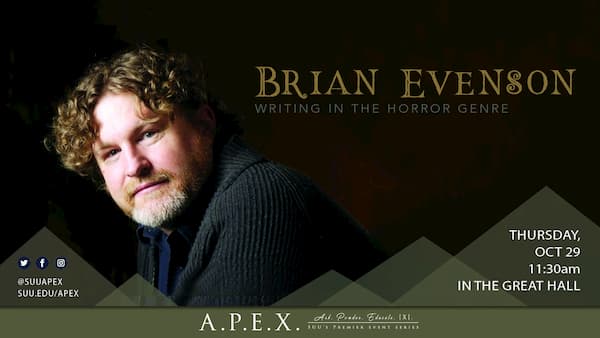
Brian Evenson is the author of a dozen books of fiction, most recently the story collection A Collapse of Horses and the novella The Warren. He has also recently published Windeye and Immobility, both of which were finalists for a Shirley Jackson Award. His novel Last Days won the American Library Association's award for Best Horror Novel of 2009. Other books include The Wavering Knife, Dark Property, and Altmann's Tongue.
In today's event, the author speaks with Lynn Vartan, Chris Clark and fellow author Todd Petersen about his books and what its like writing novels and stories in the horror genre - hope you can join us!
Recommended Reading
- Edward Albee - The Zoo Story
- Robert Aickman
- Rose Andersen - The Heart and Other Monsters
- J. G. Ballard
- Samuel Beckett
- Algernon Blackwood - The Willows, The Other Wing
- Ramsey Campbell
- Raymond Carver
- Cassandra Khaw
- Samuel R. Delany
- M. John Harrison
- Henry James
- Jeremy Robert Johnson - The Loop
- Stephen Graham Jones - The Only Good Indians
- Franz Kafka
- Stephen King
- H.P. Lovecraft
- Usman T. Malik - Midnight Doorways
- Magnus Mills - The Restraint of Beasts
- Michael Moorcock - Elric of Melniboné books
- Bradford Morrow
- Edgar Allan Poe
- Lemony Snicket - A Series of Unfortunate Events series
- Muriel Spark - The Prime of Miss Jean Brodie
- Peter Straub
- Paul G. Tremblay - Survivor Song
- Jeff and Ann VanderMeer - The Weird
- Dan Wells
- Gene Wolfe - The Book of the New Sun
- Marguerite Young - Miss MacIntosh, My Darling
Reflection
On October 29, 2020, A.P.E.X. Events celebrated Halloween with horror author, Brian Evenson. Evenson is an American academic and writer of both literary fiction and popular fiction, some of the latter being published under B.K. Evenson. His fiction is often described as literary minimalism but also draws inspiration from horror, weird fiction, detective fiction, science fiction, and continental philosophy. Evenson makes frequent use of dark humor and often features characters struggling with the limits and consequences of knowledge. Evenson is the author of a dozen books of fiction, most recently the story collection Song for the Unraveling of the World (2019), which was the winner of the Shirley Jackson Award. He has also recently published the collection A Collapse of Horses and the novella The Warren. Evenson spoke live over Zoom, joined by A.P.E.X. Events Director, Dr. Lynn Vartan, SUU Professor of English, Dr. Todd Petersen, and SUU Engagement & Instruction Librarian, Christopher Clark, who were onstage in person.
Brian kicked off the discussion with a telling of one of his short stories, No Matter Which Way We Turn. Afterwards, Brian and Dr. Petersen reconnected and shared with the audience how the two had met back in Seattle in 1991; they had studied together at Oklahoma State University. Christopher, on the other hand, had not personally met Brian before, but became familiar with his work as a reader and learned after talking to Dr. Petersen that they had a connection with Brian. Dr. Vartan proposed the next question to the trio: what is unique and special and intriguing about the horror genre as writers and readers? “I think that horror that's done well can offer you a lot of what you get in literary writing, but it's also scary,” Brian said, “And, you know, it has kind of resonances and does a lot with mood and things like that.” Brian also mentioned how horror can influence people’s view of the world around them to become unsettling, and how the COVID-19 pandemic has influenced that greatly.
As the discussion continued on, Brian shared many insights into his specific writing process, writing short stories as opposed to longer novels, and reading multiple genres of books, even if they’re ones that don’t interest individual readers, as well as suggesting many books and authors for people to read. Brian went on to discuss finding time to write as a budding writer, saying, “It was just the act of repetition that was really useful. So I think, especially with young writers, I think it's really important to write every day. I don't write every day now, but I do something kind of related to writing every day, you know, whether that's translating or doing a certain kind of reading or, or, you know, something like that,” as advice to young writers.
- By Emily Sexton
Podcast
Video
Photos































